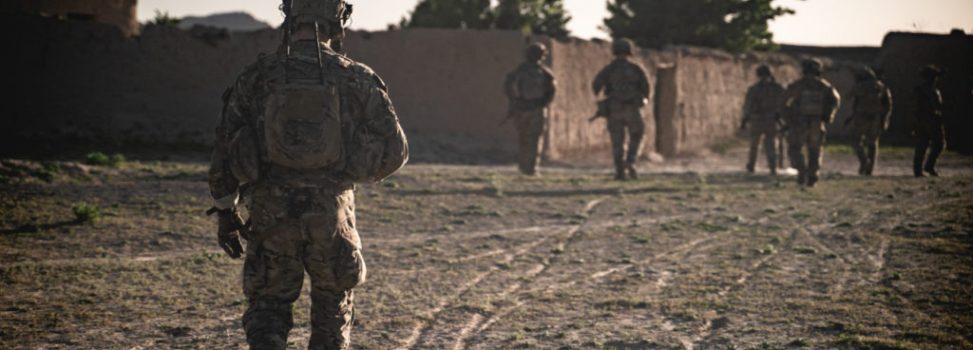War and Reconstruction Afghanistan Lessons Learned: Have we really?
September 22, 2022
SPEAKER:
Ms. Catherine Bateman
U.S. Institute of Peace
DISCUSSANT (Invited):
BGEN Joe Shaefer
NSF Program Committee
You are invited to a Zoom webinar.
- When: Thursday, September 22, 2022 09:00 AM Pacific Time (US and Canada)
- Topic: “War and Reconstruction Afghanistan Lessons Learned: Have we really?“
- Register in advance for this webinar:
- https://us06web.zoom.us/webinar/register/WN_AEHJZoakQzqw6gIo35OtPw
- After registering, you will receive a confirmation email containing information about joining the webinar.
To help you stay informed about the rapidly changing and very dangerous situation in Ukraine please check out our Ukraine War resource blog page on the NSF website where we are posting timely information and thought pieces from different perspectives. You can also watch videos of all of our programs at our website: NSF website. I encourage you to send topic requests, and questions, to me at: mccarthy@nationalsecurityforum.org
Welcome back! NSF took a short break over the summer to regroup on staff, board, and program plans. We hope everyone enjoyed a safe and enjoyable return to summer activities. NSF has undergone some important changes over the last couple of months. Kevin Schaller, NSF Board President, or I will send an update letter out in the next couple of weeks outlining personnel changes and future plans for NSF. In the meantime, please be patient as we reinvigorate both our virtual and in-person programs.
“One year since the Taliban took over Afghanistan, they still hold a firm grip on power; they control most of the country and face no viable opposition. The war that ended when the Taliban entered Kabul last year has not resumed. However, that the group remains in full control is surprising: Its regime has faced immense challenges, including struggles for legitimacy and internal divides. The Taliban’s hold on power could still become shaky in the next year.” (Foreign Policy 18 Aug 2022)
To kick-off our fall virtual program series we thought it was timely and important to take a retrospective look at the War in Afghanistan, 21 years after it started and one year after we withdrew our forces, precipitously. Reams of studies and analyses have been written about US military and diplomatic actions during 20 years of war. Our time there has been a series of successes and failures, accomplishments and setbacks, plans made and scrapped, promises made and broken, land taken and lost, girls educated and not, and the list goes on.
Few organizations have tracked our time in Afghanistan more thoroughly and consistently than the Special Inspector General for Afghanistan Reconstruction (SIGAR) SIGAR website. Established in 2008, SIGAR was charged with promoting efficiency and effectiveness of reconstruction programs and to detect and prevent waste, fraud, and abuse. SIGAR conducted extensive work and published numerous in-depth reports including Audits & Inspections, Investigations, Special Projects, and Lessons Learned. The US Institute of Peace, an independent federal institution, is currently conducting a more narrow lessons learned effort, focused on our failure to reach a political settlement to the conflict.
As we look back at the time engaged in our longest war it is especially relevant and poignant to examine lessons learned. NSF is honored to have Ms. Catherine (Kate) Bateman, a former project lead for SIGAR’s Lessons Learned Program and currently a senior expert on Afghanistan at USIP, leading their lessons learned effort, join us to reflect on what we got right, wrong, or missed entirely…and what we can do better in the future. In Washington parlance, federal agencies regularly consider “lessons learned” after an event, only later to find out that they were only “lessons observed,” all too often destined to be repeated.
We are grateful to Ms. Bateman for her time working to ensure that vital lessons are actually learned, or at least shared widely with policy makers and the public. She will share a few of these important lessons with us virtually (on Zoom) on Thursday 22 September 0900-1015 PDT.
Kate has graciously shared some important links for the students among you who would like some homework before our event. We will also post these links on the event page on the NSF website. We look forward to hearing from you with thoughts and questions during our webinar.
Links to share:
Afghanistan – What Happens Next: “Over the Horizon” is Nonsense. We Need New Friends in Bordering Nations by Joseph L. Shaefer, US Army (retired), Aug 4, 2021
https://nationalsecurityforum.org/2021/08/21/blog-post-afghanistan-what-happens-next/
Laurel Miller’s excellent testimony before the Senate Foreign Relations Committee, November 17, 2021, in the only US congressional hearing to date, since the Taliban takeover, that has focused on lessons from Afghanistan: https://www.foreign.senate.gov/imo/media/doc/111721_Miller_Testimony.pdf
Report by Steve Brooking, one of few Westerners who has spent significant time with all the various parties to the Afghan conflict since 2001, published by USIP. The report looks in depth at three key missed opportunities for pursuing a political settlement of the conflict, and why those opportunities were ignored, spurned, or missed: https://www.usip.org/publications/2022/08/why-was-negotiated-peace-always-out-reach-afghanistan-opportunities-and
Report by the Special Inspector General for Afghanistan Reconstruction (SIGAR) that distilled lessons from the previous 10 reports by SIGAR’s Lessons Learned Program: https://www.sigar.mil/pdf/lessonslearned/SIGAR-21-46-LL.pdf
Links to all 12 SIGAR lessons learned reports to date (also executive summaries only, and interactive highlights): https://www.sigar.mil/lessonslearned/lessonslearnedreports/index.aspx?SSR=11&SubSSR=60&WP=Lessons%20Learned%20Reports
Kate Bateman’s commentary one year after the Taliban takeover, on what’s next for US policy in Afghanistan: https://www.usip.org/publications/2022/08/year-after-taliban-takeover-whats-next-us-afghanistan
Stay tuned in and watch videos of our recent NSF programs on our War in Ukraine series and earlier programs at: https://nationalsecurityforum.org (scroll to the bottom of the landing page to watch the videos). Please join us for these very important and timely programs and be ready to share your thoughts and questions with our speakers.
Kate Bateman is a senior expert on Afghanistan for the U.S. Institute of Peace, a national, nonpartisan, independent institute. She is currently leading a lessons learned initiative at USIP on the failure to achieve a political settlement of the conflict in Afghanistan from 2001 to 2021. Previously, Bateman was a project lead in the Lessons Learned Program at the Special Inspector General for Afghanistan Reconstruction (SIGAR), where she led reports on anticorruption, counternarcotics, reintegration of ex-combatants and gender equality. From 2016-2017, as a Council on Foreign Relations International Affairs Fellow at the Center for a New American Security (CNAS), Bateman researched and wrote on corruption as a national security issue. She has also served in intelligence and policy positions at the State Department in Washington, Afghanistan, and Sri Lanka. Bateman served at US Embassy Kabul in late 2010 to early 2012, coordinating with Afghan ministries and other donor governments on Afghanistan’s national development strategy, and supporting the office of Special Representative for Afghanistan and Pakistan Richard Holbrooke. Bateman previously was a legislative aide for Representative Tom Allen (ME) on Capitol Hill. Bateman’s research focuses on the Afghanistan conflict, stabilization and peacebuilding efforts in fragile states, and the intersection of corruption and U.S. foreign policy interests. She has a master’s in international relations from the Johns Hopkins University School of Advanced International Studies and a bachelor’s from Middlebury College. In addition to Bateman’s published work at USIP, SIGAR, and CNAS, her analysis has appeared in Foreign Affairs, Lawfare, The National Interest, The Hill and Proceedings. She is the author of a chapter in the forthcoming book Gathering Wisdom from Experience—Lessons Learned from America’s Longest War, a project hosted by the University of South Florida in partnership with the National Defense University.
The National Security Forum is a non-partisan, educational, nonprofit organization dedicated to fostering civil discourse and informed discussion about timely and important national security topics. We bring expert speakers from around the U.S. to talk about national and international security, domestic and foreign terrorism, economic and financial threats, the safety of our food and water supply, energy policy, electrical grid stability, and a variety of other topics that affect all Americans. The National Security Forum partners with the Washoe County School District to host an annual Youth Security Forum to encourage future generations national security leaders.


